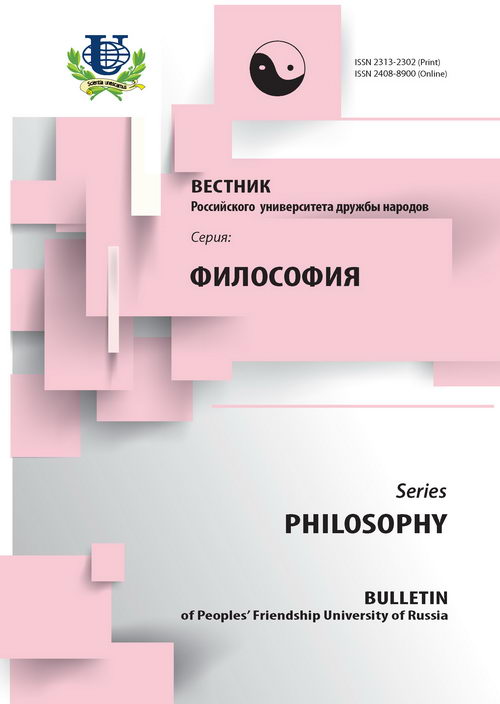No 2 (2011)
- Year: 2011
- Articles: 14
- URL: https://journals.rudn.ru/philosophy/issue/view/710
Articles
Editorial note <http://www.multitran.ru/c/m.exe?t=3289471_1_2>
RUDN Journal of Philosophy. 2011;(2):5-5
 5-5
5-5


A History of One Dispute: F. Dostoyevsky and K. Leontiev on the Essence of Christianity
Abstract
The axis of the publication is K. Leontiev's criticism of Dostoyevsky's rosy Christianity. The pivotal characteristics of Leontiev's world-view and his Christian vision are outlined. The specificity of Dostoyevsky's outlook expressed in his Pushkin Speech and in his last novel - the Brothers Karamazov is also revealed in this very item. Special emphasis is given to a wide range of critical estimates of the given dispute in the history of Russian culture and philosophy up to the present moment.
RUDN Journal of Philosophy. 2011;(2):6-15
 6-15
6-15


The Memphite Theology as a Source of Ancient Egyptian Theocosmogony
Abstract
The article focuses on philosophical aspects of theocosmogony in the so called Memphite Theology (the Shabaka Stone), one of the most prominent ancient Egyptian religious texts. The concepts of theogenesis and cosmogenesis appear to be of considerable interest in terms of historico-philosophical reconstruction of the conceptual issues of the Memphite theocosmogony. The author offers historical and philosophical approach to analyzing the theme of creation in this notable source of ancient Egyptian pre-philosophical thought.
RUDN Journal of Philosophy. 2011;(2):16-24
 16-24
16-24


What Makes «Communication» Possible?
Abstract
The article presents sufficient space for a thorough analysis of the conceptual issues of the Communicative Programme (the CP) developed by E. Husserl, L. Wittgenstein, K.-O. Apel, and J. Habermas who attached great importance to the fundamental role of communication in epistemological justification.
The CP analysis carried out in the article is based on a number of models worked out to provide insight into the following two arguments of the CP proponents: 1) the CP statements are justified through their universal validity; 2) There is no pure individual in the communicative society (CS). It is demonstrated that the former argument leads to a vicious circle, while the latter one - heads to overt absurdity in terms of logic.
RUDN Journal of Philosophy. 2011;(2):25-34
 25-34
25-34


Emergence, Varieties of Explanation, and the Generality of Laws (Part II)
Abstract
The principal aim of this paper is to show that a constraint that C.D. Broad imposed on the acceptability of deductions of macroproperties which would show them to be non-emergent, viz. that they use only general laws of nature, is too strong and should be replaced by the weaker condition that the deductions be non-trivial. First, the relevant notion of generality is made more precise. I propose that a law is general iff it is applicable to a diversity of phenomena relative to what I call domain constitutive properties. In order to substantiate the claim that Broad's constraint is too strong I analyse three examples of explanations of macroproperties from robotics and the life sciences. All of them are non-trivial explanations and should thereby render the explained properties non-emergent. Finally, I briefly indicate three ways in which an explanation may be non-trivial.
RUDN Journal of Philosophy. 2011;(2):35-44
 35-44
35-44


The Development of Network Society Theory
Abstract
The article offers a systematic analysis of the issues related to the network society as a subject matter of theoretical research. The organizational structures classification is provided primarily to expose the peculiar features of hierarchical and network structures. The origins and sources of network management philosophy are pointed out and the reasons for its growing popularity are examined. Further on the author focuses on the shaping of the network society concept per se offering insight into its three most popular modifications, i.e., the soft (moderate) modernist perspective, the soft postmodernist, and the hard (radical) postmodernist one. Finally, the key discussion points in the wake of network society development in the Russian conservative patriotic circles are outlined to demonstrate social significance of the topic involved.
RUDN Journal of Philosophy. 2011;(2):45-52
 45-52
45-52


History of Philosophy as a Discipline of Philosophical Knowledge
RUDN Journal of Philosophy. 2011;(2):53-60
 53-60
53-60


The Impact of Catholicism on the Spiritual Life of Vietnam
RUDN Journal of Philosophy. 2011;(2):61-67
 61-67
61-67


Abu Hayyan at-Tawhidi's «Enjoyment and Convivality Book» in the Context of the Medieval Arabic Philosophy
RUDN Journal of Philosophy. 2011;(2):68-69
 68-69
68-69


«Enjoyment and Convivality Book». The First Night (trans. from Arabic by Palenko M.S.)
RUDN Journal of Philosophy. 2011;(2):70-77
 70-77
70-77


A Review of the Collected Volume Human Being - History - Culture III
RUDN Journal of Philosophy. 2011;(2):78-81
 78-81
78-81


A Review of the Textbook by A.V. Savka The Fundamentals of Economic Philosophy
RUDN Journal of Philosophy. 2011;(2):82-85
 82-85
82-85


SCIENTIFIC LIFE
RUDN Journal of Philosophy. 2011;(2):86-88
 86-88
86-88


On Our Authors
RUDN Journal of Philosophy. 2011;(2):89-90
 89-90
89-90
















